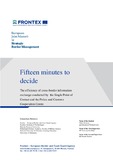Fifteen minutes to decide : The efficiency of cross-border information exchange conducted by the Single Point of Contact and the Police and Customs Cooperation Centre
Kokkuvõte
The aim of this master's thesis is to provide a well-detailed insight into the current situation and future direction of international police information exchange within the European Union.The author tried to achieve this goal by introducing the relevant scientific theories in the field of cooperation and information exchange between institutions and using them as a starting point for a mixed methods study.
Kirjeldus
1. Introduction ; 2. Literature review ; 2.1. Introduction ; 2.2. The relevance of police cooperation and information exchange ; 2.3. The definition of information exchange ; 2.3.1. Forms of interactions ; 2.3.2. Levels and efficiency of information exchange ; 2.4. Factors effecting inter-organisational information exchange ; 2.4.1. Organisational environment and management ; 2.4.2. Policy, legal environment ; 2.4.3. Technological environment ; 2.5. Sub-conclusion ; 3. Research methodology ; 3.1. Introduction ; 3.2. Research design ; 3.3. Sample strategy and context ; 3.4. Data collection and use of data ; 3.4.1. Desk research ; 3.4.2. Analysis of the desk research ; 3.4.3. Questionnaire ; 3.4.4. The procedure of the questionnaire ; 3.4.5. The analysis of the questionnaire ; 3.4.6. The in-depth interview ; 3.4.7. The analysis of the interviews ; 3.5. Quality aspects ; 3.6. Ethical considerations ; 4. Results of the desk research ; 4.1. Introduction ; 4.2. Organisational Environment ; 4.2.1. Culture ; 4.2.2. Work of the channels ; 4.2.3. Choice of the channels ; 4.3. Policy / Legal Environment ; 4.4. Technological environment ; 4.5. Sub-conclusion ; 5. Results of the questionnaire ; 5.1. Introduction ; 5.2. Sample description ; 5.3. Correlations ; 5.3.1. Centralisation ; 5.3.2. Organisational support ; 5.3.3. Organisational culture ; 5.3.4. Leadership ; 5.3.5. Rewards & Incentives ; 5.3.6. Factors and their importance ; 5.3.7. Information Exchange process ; 5.3.8. Use of channels ; 5.3.9. National Legislation ; 5.3.10. EU Legislation ; 5.3.11. Technological environment ; 5.4. Regression analysis ; 5.5. Independent t-test, the efficiency of the SPOC and the PCCC ; 5.6. Sub-conclusion ; 6. Results of the interviews ; 6.1. Introduction ; 6.2. Organisational environment ; 6.2.1. Organisational structure and culture ; 6.2.2. Leadership and management, staffing ; 6.2.3. Personal relationship, trust ; 6.3. Work and choice of the channels ; 6.3.1. The SPOC ; 6.3.2. The PCCC ; 6.3.3. The informal channel ; 6.3.4. Parallel channels ; 6.4. Legal and technological environment ; 6.5. Sub-conclusion ; 7. Conclusions, discussions and recommendation ; 7.1. Introduction ; 7.2. Conclusions ; 7.2.1. The channels ; 7.2.2. Factors influencing and predicting the efficiency of information exchange ; 7.2.3. Differences in efficiency ; 7.3. Discussion ; 7.4. Limitations ; 7.5. Recommendations



